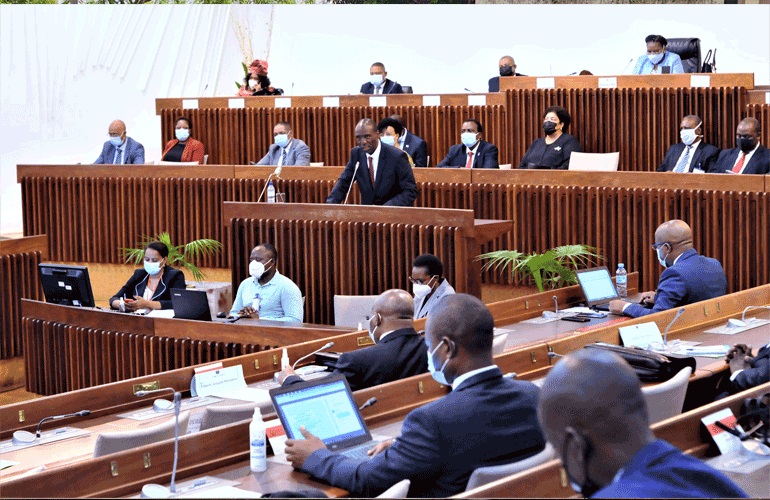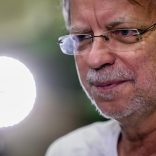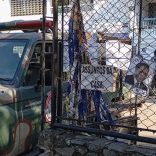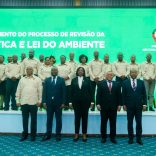Mia Couto calls for a more inclusive dialogue in Mozambique after general elections
Mozambique: Government must adjust measures in line with evidence

Photo: Noticias
Mozambican Prime Minister Carlos Agostinho do Rosario on Thursday warned that the behaviour of the coronavirus that causes the Covid-19 respiratory disease is unpredictable “with a trend to constant mutations and the appearance of new variants – that’s what’s happening in our country and throughout the world”.
Speaking in the Mozambican parliament, the Assembly of the Republic, at the end of a two day debate on the government handling of the pandemic, Rosario said this was “a new phenomenon, which we have been learning to deal with every day”.
Viral mutations were part of the reason why governments “adjust their restrictive measures in the fight against Covid-19, relaxing or tightening them, depending on the epidemiological situation of each moment”.
In December, Rosario continued, the Mozambican government thought it appropriate to relax the preventive measures, in the light of statistics which seemed to suggest a reduction in the number of Covid-19 cases. The government had wanted “to revive economic activity and mitigate the impacts on the productive sector”.
But this was precisely the time when a new coronavirus strain, known as the South African variant, much more aggressive than the initial virus, spread through the southern African region, including Mozambique.
Rosario blamed the South African variant, plus a general relaxation in preventive measures, for the sharp deterioration in the Mozambican epidemic as from early January.
Government decisions, he said, must always take into account “the evolution of the pandemic and its impact on the socio-economic life of the country”. In its attempt to save human lives, the government might have to take unpopular measures – such as the current curfew in the Greater Maputo area from 21.00 to 04.00 every night.
Although opposition deputies claimed that the curfew is unconstitutional, Rosario said scientific evidence suggested that the curfew helped cut rates of viral transmission by 75 per cent. He believed the curfew was justified by the critical situation Maputo and the surrounding area had faced in January and February, when the high rate of occupation of intensive care beds suggested that the health system in the capital was near collapse.
Since the curfew was introduced, the positivity rate (the proportion of people tested found to be carrying the virus) in Greater Maputo has fallen, said the Prime Minister, as has the number of hospitalisations “which indicates a certain efficiency of this measure (the curfew) in achieving our main objective which is to avoid the collapse of our health system and to save lives”.
One sign of the improvement in the situation in Maputo was given by Health Minister Armindo Tiago, who said that, although a major effort has been made to equip the Mavalane General Hospital so that it can cope with an avalanche of Covid-19 patients, it has not proved necessary to bring its 258 intensive care beds into service.
Contrary to the fears expressed in January, there is still room for more patients in the two health units in the capital that have borne the brunt of caring for Covid-19 victims – the Polana Canico General Hospital and Maputo Central Hospital.
Turning to the Covid-19 vaccination under way across the country, Rosario said that the 684,000 doses so far received “do not cover our needs”. Indeed, since each person needs two doses, the amount available so far is only enough for 342,000 people.
“We are continuing to work with bilateral and multilateral cooperation partners to obtain more vaccines and cover the largest possible number of Mozambicans”, said the Prime Minister. He was sure that, thanks to Mozambican diplomacy, a further 1.7 million doses of vaccine will arrive in the country by May.
Mozambican schools are supposed to reopen this month for face-to-face teaching – but Rosario insisted this can only happen if all schools implement the basic Covid-19 prevention measures, such as regular hand washing, social distancing and the use of face masks.
“If each of us acts responsibly, we will be establishing the necessary conditions for resuming face-to-face classes safely, so that our students may be trained in such a way that we continue to enjoy human capital capable of driving the development of our country”, he said.












Leave a Reply
Be the First to Comment!
You must be logged in to post a comment.
You must be logged in to post a comment.